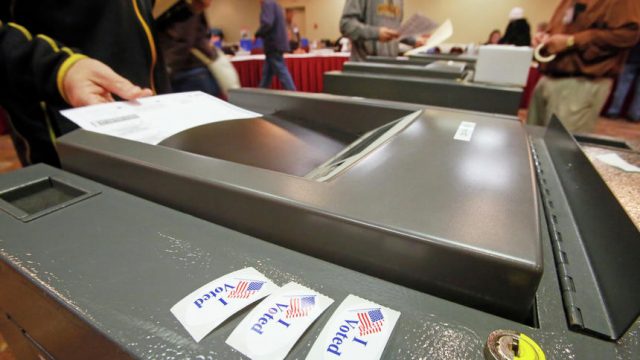After the Furor Over North Dakota’s Voter ID Laws Study Finds Those Sort of Policies Don’t Actually Suppress Votes

Voters cast their ballots Monday, Oct. 31, 2016, at the Baymont Inn in south Fargo. David Samson / The Forum
A new working paper published by the National Bureau of Economic Research finds that voter ID laws “have no negative effect on registration or turnout, overall or for any group defined by race, gender, age, or party affiliation.”
The researchers made some 1.3 billion observations, collected from 2008 to 2016, which they say support this argument. “These results hold through a large number of specifications and cannot be attributed to mobilization against the laws, measured by campaign contributions and self-reported political engagement,” they conclude.
But before supporters of voter ID laws get too excited, there’s also this: “ID requirements have no effect on fraud either – actual or perceived.”
So, it seems, the most compelling argument opponents of voter ID laws can make against them, based on this data, is that they don’t change much of anything.
Though supporters can still argue that putting in place basic protections for the ballot box can deter attempts at fraud. After all, if we’re not doing anything to ensure the people casting ballots are legally allowed to do so, how would we ever know if fraud is happening in the first place?
Anyway, not so many months ago voter ID laws in North Dakota were a national story, with the narrative embraced by most journalists holding that the laws were instituted to suppress voters most likely to vote for then-Senator Heidi Heitkamp. Mostly Native Americans.
But what we found, once the ballots were cast, which seems to support the conclusions of this paper, is that turnout among North Dakota’s Native American communities actually went up significantly during the 2018 election. It was record-setting, by some measures.
Voter ID opponents will argue that the record turnout was because activists descended on Native American communities to help the voters there cast their ballots.
One might argue, in rebuttal, that if all it took to overcome North Dakota’s dastardly voter ID laws was a little education and organizing maybe the law wasn’t actually so dastardly to begin with.
Which, again, is the conclusion of this research. Despite all the political Sturm und Drang around voter ID laws, even when they’re in place voting in America generally (and in North Dakota, specifically) is pretty darn easy.




